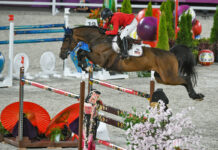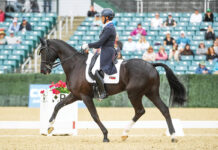Staring ahead at the short, chilly days of winter can leave riders feeling desperate. Poor weather and lack of daylight might force them to abandon their riding routines. Their horses will lose fitness, their skills rust over. By revising our routines, though, winter does not have to be so bleak. We can still be plenty productive. Doing so means accepting the value of workouts at the walk. Note how I have used the term “workout,” since that is how you should think of them. These are workouts, not strolls.
Because the walk does not require much physical effort on our part as riders, it is common to drift off and lose focus. Some riders assume it is not worth saddling up if they’re restricted to only walking. Neither of these scenarios allow riders to reap the enormous benefits of time spent schooling the walk. Change your approach this winter. Use days of inclement weather to re-tool how you perceive these quieter workouts and just what you can accomplish.
Work at the walk, practiced and touted by old classical dressage masters, is highly fruitful for educating the horse’s body, confirming postures, and loosening him. Walking allows for full contraction of the long back muscles within a pulsating and swinging motion that prevents tension. To the contrary, the static, stabilizing role played by the back when trotting can create tightness. Its low aerobic effort ensures recruitment of small muscles that support the spine, the ones that create and store postural patterns. Further, the fine-tuned motor control that is possible at the walk enables riders to help their horses find more range of motion and joint flexion.
Even during the darkest, shortest days it’s likely you can find 25 minutes to get on and ride one of the walk routines below. Really concentrate on creating the highest quality movements and figures for those 25 minutes. Treat them with the same focus as you would a dressage test. You can extend their benefits by dynamic stretches or calisthenics prior to mounting: backing up, lateral work in hand, talk traction, belly lifts. (for more ideas, consult my book Equine Fitness).
If you remain diligent with these 25-minute workouts at least three times per week, you’ll maintain most of the tone in your horse’s deep cybernetic muscle system. In the spring, you will only need to restore his cardiovascular conditioning, which happens quickly in comparison to building strength. Below are three suggestions and brief descriptions for exercise routines to fill a 25-minute session. I recommend spending about two minutes on each exercise and continuing to cycle through the routine until your time is up.
WORKOUT ONE: Symmetry
Poll Flexion, from the ground: Using your hands, slowly and gently swivel the horse’s head, not neck, from side to side to loosen his poll.
Polish your Turns: Interspersed with segments of intervals of active, ground-covering walking, practice several turns on the forehand and turns on the haunches in each direction.
Proprioception Box: Arrange a box using four ground poles with the corners of the box lifted on risers. Now ride a variety of patterns over and through the box—cloverleaf, circle around each corner of the box, figure eight.
Schaukel: From a balanced halt, back up eight strides and then ride immediately forward eight strides. Repeat this forward-backward movement.
WORKOUT TWO: Adjustability
Accordion Topline: Riding around the edge of your arena in a brisk, forward walk practice lengthening and shortening your reins and asking your horse to change frames, from longer to shorter.
Spiral In and Out: From a 20-meter circle, spiral in to an 8 meter circle and then, maintaining inside bend, leg-yield back out to your original 20-meter circle being careful not to lose energy.
Snowman: Ride once around a 20-meter circle to the left and then, at the top, change bend and ride a 10-meter circle to the right. Then resume your 20-meter circle. Your figure should look like a snowman with a fat body and a smaller head on top.
Adjustment Poles: Set up four to five ground poles in a fan shape with the ends touching on one side. Arrange the poles so that, at their middles, they are spaced 5-feet apart. Now ride a small circle that crosses over the poles. Alternate riding over the narrowest distance between poles (with just a single stride between each one) and riding over the wider distance (with two strides between each one).

WOROUT THREE: Coordination
Speed Changes: Ride various figures in the arena while changing the speed of your walk. Aim for four distinct speeds (super slow, slow, medium, and fast), spend 20 strides at each speed. Repeat.
Cornerstone Transitions: Ride transitions to the halt every ten strides. At every other halt transition, ask the horse to back up 6-10 steps and then carry on.
Wavy Lines: Ride a “scalloped” edge around the track of your arena. Maintaining a brisk, lively walk tempo ride a shallow serpentine with loops of approximately 3 meters back and forth from left to right to left to right.
Get more training ideas:
Dressage Challenge: Arena Workouts
Try This: Riding Over Raised Poles






Excellent article! I live in a part of the country with harsh Winters and wet Springs. I don’t have a riding arena, just open pastures, so ground conditions often limit my riding year-round. I love all these different ideas for riding at the walk. I can’t wait to print them out and add them to my riding routines for 2016! Thank you.